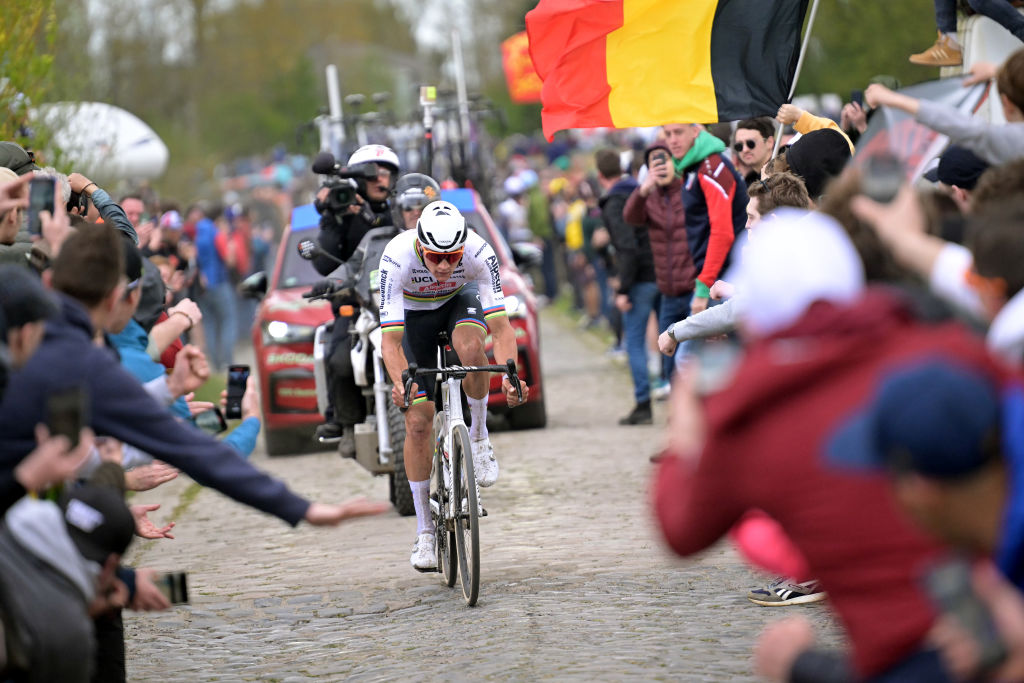
Broadcasters and race organisers depend on average speed predictions for races to plan their programmes but in the past few years, the Spring Classics have been clicked off at speeds that eclipsed even the fastest expected pace.
On Sunday, Mathieu van der Poel (Alpecin-Deceuninck) completed the 259.7km course for Paris-Roubaix in five hours, 25 minutes and 58 seconds - a full 15 minutes faster than anyone expected for the race winner.
It's the third year in a row the Paris-Roubaix speed record has been broken. Last year, Van der Poel chipped more than a kilometre per hour off the average speed record, covering the course at 46.841 kph. This year he went an average of 47.802 kph.
This year's record in Paris-Roubaix was the fastest non-time trial, WorldTour race ever run - that includes stages of the Tour de France and mostly flat, paved races like Milan-San Remo.
The Paris-Roubaix record was one of five Spring Classics to be run at record speeds this season.
It's not just Van der Poel breaking the records, however. Omloop Het Nieuwsblad winner Jan Tratnik (Visma-Lease a Bike) carved 2 kph off the previous record, finishing the 202.2km race at a 44.691 kph average speed.
His teammate Wout van Aert set the Kuurne-Brussel-Kuurne speed record the next day at 45.147 kph.
The record fell in Milan-San Remo for the second straight year, with Jasper Philipsen breaking Van der Poel's 2023 mark when he finished the race at 46.11 kph.
Then came the Tour of Flanders: Even winning with a 45-kilometre solo attack, Van der Poel crushed the record by almost half a kilometre per hour.
In Paris-Roubaix, he did it again, this time riding away alone for a full 60 kilometres and still setting the record without the benefit of the draft in the peloton.
Cyclingnews looked at the average speeds of the main 14 Spring Classics: Brabantse Pijl, Classic Brugge-De Panne, Dwars door Vlaanderen, E3 Harelbeke, Gent-Wevelgem, Koksijde Classic, Kuurne-Brussel-Kuurne, Milan-San Remo, Nokere Koerse, Omloop Het Nieuwsblad, Paris-Roubaix, Scheldeprijs, and Strade Bianche.
The overall speed average for all of these races combined has gone up steadily over the past two decades from around 41.5 kph in 2004 to a breakneck 44.8 kph this year. Even the average speed of all 14 races for the past decade is a full kilometre per hour faster than the decade before.
There are a few explanations that could account for such a dramatic increase in pace, such as favourable weather, aerodynamic advances in riders' equipment, and race tactics. Races are faster today than even in the EPO-fuelled era of the 1990s and 2000s, but even L'Equipe didn't mention the possibility of doping in explaining the rising speeds in races.
Most riders in Paris-Roubaix elected to race on aerodynamic frames rather than other models specifically designed for pavé, with Specialized seeing most riders choose the Tarmac over the Roubaix. Lidl-Trek riders used the aero Madone model while Van der Poel used the Canyon Aeroad.
Helmets and clothing have also become more aerodynamic while fatter tyres, thought to be slower because of rolling resistance in past decades, are now much more widely used since that fear has been debunked.
Weather played a big factor in the pace of Paris-Roubaix this year, with a strong favourable tailwind. There was warm weather as well, the rain earlier in the week packing the dirt between the cobbles rather than dryer years where the pavé becomes slick with dust.
Tactics have a part, too, with a huge fight to make the breakaway leading to a 50 kph first hour. When Soudal-QuickStep put Kasper Asgreen into the move that managed to get away, that ensured that Alpecin-Deceuninck would limit their gap, keeping the speed higher.
The average speeds of each of the Spring Classics varied wildly over the past 25 years but the Monuments in particular show a very distinct upward trend across the past few years.
Get unlimited access to all of our coverage of the Spring Classics- including reporting, breaking news and analysis from the Paris-Roubaix, Amstel Gold, Liège-Bastogne-Liège and more. Find out more.







